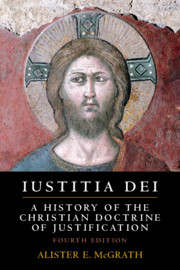Book contents
- Iustitia Dei
- Iustitia Dei
- Copyright page
- Contents
- Tables
- Preface to the Fourth Edition
- Abbreviations
- Introduction
- Part I Justification
- Part II The Middle Ages
- Part III Protestantism
- 11 Is There a ‘Reformation’ Doctrine of Justification?
- 12 Luther’s Early Approach to Justification
- 13 Justification in Lutheranism, 1516–1580
- 14 Reformed Theology, 1519–1560
- 15 The English Reformation
- 16 Protestant Orthodoxy
- 17 Anglicanism
- 18 Puritanism
- 19 Pietism
- Part IV Catholicism
- Part V The Modern Period
- Conclusion
- A Brief Glossary of Medieval Soteriological Terms
- Works Consulted
- Index
15 - The English Reformation
From Tyndale to Hooker
from Part III - Protestantism
Published online by Cambridge University Press: 27 January 2020
- Iustitia Dei
- Iustitia Dei
- Copyright page
- Contents
- Tables
- Preface to the Fourth Edition
- Abbreviations
- Introduction
- Part I Justification
- Part II The Middle Ages
- Part III Protestantism
- 11 Is There a ‘Reformation’ Doctrine of Justification?
- 12 Luther’s Early Approach to Justification
- 13 Justification in Lutheranism, 1516–1580
- 14 Reformed Theology, 1519–1560
- 15 The English Reformation
- 16 Protestant Orthodoxy
- 17 Anglicanism
- 18 Puritanism
- 19 Pietism
- Part IV Catholicism
- Part V The Modern Period
- Conclusion
- A Brief Glossary of Medieval Soteriological Terms
- Works Consulted
- Index
Summary
Chapter 15 considers the reception and development of continental theologies of justification in England from Henry VIII to Elizabeth I. Early English reforming theologies of justification tended to be Augustinian, interpreting justification as a process of making people righteous by grace. An increasing familiarity with the works of Luther does not appear to have led to a widespread adoption of Lutheran ideas on the forensic character of justification. Many of the Church of England’s formularies of faith speak of justification as consisting of the ‘remission of our sins’ and our ‘perfect renovation in Christ’. The essential feature of Luther’s doctrine of justification appears to have been understood to be its emphasis on faith alone. Luther’s influence over the English Reformation declined after the death of Henry VIII, and was replaced by various forms of Reformed theology, particularly that of Bucer. By the middle of the reign of Elizabeth I, the English Reformation appears to have developed its own approach to understanding the nature of justification, while affirming the basic Protestant notion of justification ‘by faith alone’.
Keywords
- Type
- Chapter
- Information
- Iustitia DeiA History of the Christian Doctrine of Justification, pp. 227 - 236Publisher: Cambridge University PressPrint publication year: 2020



